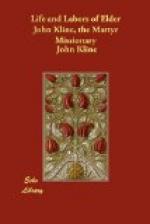Could any one resolve better? Could an angel from heaven, if sent down to live with men on earth, resolve to a better purpose? But it is easier to resolve than to carry into effect; easier to think wisely than to act wisely; easier to plan well than to execute. But of this one thing I am sure: If Brother Kline failed in any of the above resolutions, his failure was not chargeable to his will, but to his weakness. Even Paul could say: “To will is present with me, but how to perform that which is good I find not. When I would do good, evil is present with me.” The cause of this conflict in the course of every Christian’s experience is what has been very appropriately called “indwelling sin.” The serpent’s head may be bruised to death, but the tail will not die until the sun goes down. It is true, the tail is not at the dangerous end of a snake; but while the tail rattles and wriggles it gives evidence that there is still some life left; and before one turns away from it in the satisfied assurance that it needs no further attention it might be well for him to look again and make sure, beyond all doubt, that the head end has been crushed to death.
A Funeral Sermon by Elder John Kline.
At the Burial of Mrs. Lauck, Feb. 7.
TEXT.—Man that
is born of woman, is of few days, and full of
trouble He cometh forth as
a flower, and is cut down: he fleeth
also as a shadow, and continueth
not.—Job 14:1, 2.
The bulk of Divine Truth is addressed to our faith. We are not expected to receive it as we receive knowledge that is based upon our own experience, or upon the experience of others. God expects us to take his Word for the truth of what he says, whether we fully understand it or not. He addresses our faith, as a father does his child when he seeks to inculcate some truth or principle which the child cannot fully comprehend. But the text selected for this occasion is not of this character. It is addressed to our knowledge and every day’s observation and experience. We have only to look at ourselves and at others to see and feel the truth that it tells. It is not, therefore, given to teach, so much as to remind us of what, in the busy whirl of life, we may for a time partially forget. The benefit of being reminded of our mortality comes to us in the way of leading us to seek for something better than this world can give.
The phraseology of the text is exquisitely beautiful. Notice the smoothness of its rhythm, the simplicity of its style, the harmony of its cadences: “Man that is born of woman, is of few days, and full of trouble.” This is the direct opposite of what all naturally desire. All living human beings would rejoice in a life of many days, exempt from trouble. “He cometh forth like a flower.”
“They bloom in beauty, side by side;
They fill one home with glee.”




